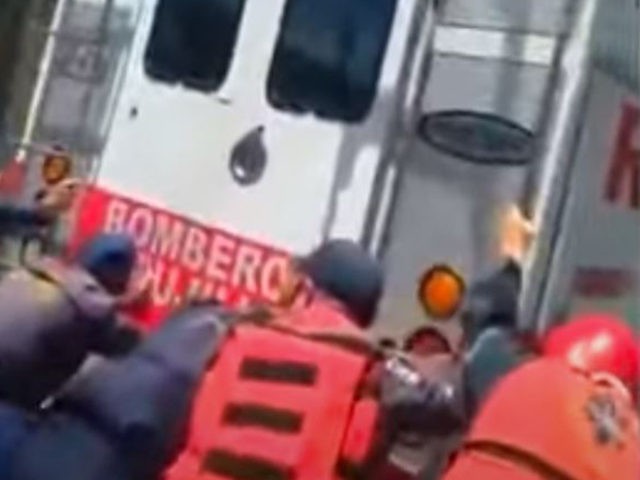Venezuelan socialist authorities reportedly arrested Deivis Pacheco on Monday for filming firemen in the country’s Trujillo state pushing along an ambulance that had run out of gasoline.
Venezuela boasts the world’s second-largest oil reserves after the United States. Yet after two decades of socialist rule and the seizure of its major oil company, Petróleos de Venezuela, its oil production has dropped to 1940s levels, necessitating imports of gasoline from allied countries like Iran. Major fuel shortages have forced thousands nationwide to stand in crowds in front of gas stations, even under a Chinese coronavirus lockdown, and have led to violence over the little gasoline available, with at least two deaths.
Pacheco stands accused of having uploaded a video to social media July 31 showing a Trujillo Fire Department ambulance stuck on the road. several men begin pushing it from behind to get it to a fuel source. The video shows the ambulance moving with the effort of multiple men as the large letters on its side reading “Rescue — Socialist Government of the State of Trujillo” pass by glacially. One of the men pushing can be heard complaining, “come help push instead of standing there recording,” to which two or three others respond and join the pushers.
Another unidentified voice can be heard saying, “and the governor says there is no problem with the gasoline — look, the firefighters’ rescue truck without gasoline!”
According to Espacio Público, an NGO that operates in Venezuela, officials with the socialist regime’s Scientific, Penal, and Criminal Investigations Body (CICPC) raided Pacheco’s home Monday and arrested him. He is reportedly facing “three or four charges, among them ‘terrorism’ and ‘incitement to hate.'”
Dictator Nicolás Maduro, having lost control of the National Assembly in the nation’s last democratic elections in 2015, created an illegal parallel legislature known as the “national constituents’ assembly” in 2017 to pass laws favorable to the socialists. Among the first laws passed by the body, which consisted of Maduro allies such as his son and his wife, was the Law Against Hatred and Fascism, which allows Maduro’s police to arrest anyone threatening “peaceful coexistence” with the regime. The regime has used the law with increased frequency not just against prominent dissidents, but against anyone speaking out against the regime or exposing the realities of its failures in any way.
The fuel situation in Venezuela — a nation that, prior to socialism, was used to abundant and nearly free gasoline — has deteriorated significantly in the past year. Overall oil production fell to levels unseen since 1947 this June at 374,000 barrels per day, compared to the about 1.3 million barrels per day experts believe Venezuela’s six largest oil refineries can produce. The steep decline occurred after the expropriation of PDVSA under Chávez, who replaced seasoned oil executives and engineers with socialist cronies who brought minimal talent and experience to the job.
The socialist government of the state of Táchira, the westernmost in the country and often the most aggressively anti-socialist, announced in late July that it would stop selling any gasoline at all — a shock to those in the state, who were told not that the move was necessary because of the well-documented shortages, but because of the Chinese coronavirus pandemic.
The need to fuel vehicles has made enforcing the lockdowns difficult for Maduro’s regime. Venezuelans have stood on long, tightly spaced lines for months to get minimal fuel rations, to buy food and, for the few that have steady employment, go to work. The tension on those lines has resulted in street fights and escalated violence, including at the hands of Maduro soldiers.
Maduro’s attorney general announced last week that police had arrested four soldiers and two civilians for killing Carlos Chaparro, a 47-year-old Venezuelan who was protesting the gasoline shortages when he was killed. Venezuela has seen exponential growth in police brutality in the last decade, particularly under Maduro. Police in the country killed thousands, most of them unarmed protesters, during the peak of the anti-socialist movement in 2014-2016. The violence particularly affects minors. Children as young as 11 have reported extensive torture at the hands of police. Police have shot to death at least two 14-year-olds in the past five years.
Teens also face violence when seeking to refuel. In mid-July, similar to Chaparro’s case, assailants killed an 18-year-old during a scuffle at a line for gasoline rations. The Maduro regime has not yet identified the culprits.

COMMENTS
Please let us know if you're having issues with commenting.